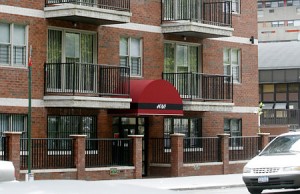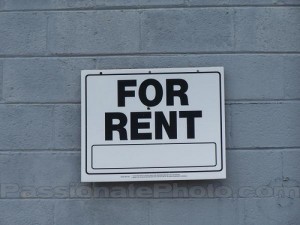Posted by Teresa on August 4, 2010 under Landlord and Tenant FAQs, Landlord Tips | 
 When rental units sit empty and you’re starting to feel desperate, it can be tempting to lower your standards and sign a lease with the first tenant who shows you the money. Experienced landlords might remember doing just that—and living to regret it.
When rental units sit empty and you’re starting to feel desperate, it can be tempting to lower your standards and sign a lease with the first tenant who shows you the money. Experienced landlords might remember doing just that—and living to regret it.
Rather than leasing to a tenant who doesn’t meet your qualifications, try to figure out why your units aren’t renting. Fix those issues and you might find the right tenant will come along sooner than you think!
10 Possible Reasons Your Rental Units are Vacant
1. The rent is too high. Check the market. Do your homework. In most markets, tenants have lots of choices. Reducing your rent is better than collecting zero rent.
2. The condition of the rental is not acceptable to good tenants. Does it look pristine or shabby? Are the railings solid or wobbly? Does the property need a coat of paint? New lighting fixtures? Ask yourself if you’d pay your rent to live there.
3. You are letting good tenants walk away. If you have a qualified applicant, don’t let them get away! Close the sale.
4. You’re not marketing the property enough. Expand your reach. Create appealing ads with great descriptions and get them out there. Put signs on the property (make sure they’re in good shape). Put arrow signs on the corners if it’s allowed.
5. The right tenants aren’t seeing your ads. Who is your ideal tenant? Where do they hang out? Whether it’s the laundromat down the street, a nearby coffee shop or Craigslist, put your ads where your best tenants will actually see them.
6. You’re not making it easy for potential tenants to reach you. Do you have a website, email and cell phone? Does your phone plan have texting? A lot of young people use texting over talking, and Gen Xers and Baby Boomers are more likely to email.
7. Your building or property manager has a bad reputation. If your current tenants are not happy with either, they are probably telling others. Ask them.
8. Your competition is giving tenants a better deal. Are there “free rent” signs on nearby properties? Find out what your competition is doing and match or beat them.
9. Your property management company (is it you?) is not doing its job. Take a hard look at how successful the rental management has been. Too many vacancies are not acceptable. And is you decide to replace them, make sure you put up “under new management” signs on your property!
10. The property looks unsafe. Visit your properties at night. How is the lighting? Are there people hanging around? Do shrubs and trees cover the windows? Fix these problems for your current tenants and potential tenants will feel safer, too.
If none of these factors apply, then you need to do some investigative work. Potential tenants won’t tell you why they decided not to sign your lease—they just go away. Follow up with the next interested, qualified tenant who disappears. Find out why they don’t want to live in your rental property. Poll your current tenants to find out what they like and dislike about living there. You need to know what’s wrong before you can fix it!
Posted by Teresa on May 7, 2010 under Tenant Credit Checks, Tenant Screening & Background Checks | 
 The Fair Credit Reporting Act (FCRA) established rules to protect privacy and guarantee report accuracy when businesses, banks, and rental property owners check consumers’ credit histories. Landlords are allowed to obtain tenant credit reports as long as they follow the FCRA’s provisions.
The Fair Credit Reporting Act (FCRA) established rules to protect privacy and guarantee report accuracy when businesses, banks, and rental property owners check consumers’ credit histories. Landlords are allowed to obtain tenant credit reports as long as they follow the FCRA’s provisions.
Specifically, when landlords obtain information about a potential tenant’s credit history, rental history, previous evictions or a variety of other pertinent personal information, and they use that information to determine what they require from the tenant, they must give the tenant an “adverse action notice.”
For example, a low credit score might mean the landlord requires a co-signer on a lease application. Or, a previous eviction may mean the tenant’s application is denied altogether. Even requiring a higher rent deposit is considered an “adverse action,” if it is based on information obtained in a consumer credit report. And really, if a landlord requires a higher deposit from Tenant B than from Tenant C, the only grounds he or she could base that decision on would be a tenant credit report—or else a discrimination claim under the Fair Housing Act could be in that landlord’s future.
When a landlord takes adverse action against a tenant applicant, the FCRA requires a notice to be supplied to the tenant. The notice must include:
- the name, address and telephone number of the Consumer Reporting Agency (CRA) from which the report was obtained;
- a statement that the CRA did not make and cannot specify the reasons for the adverse decision;
- a notice of the tenant’s right to dispute the accuracy of the information the CRA supplied;
- notice of the tenant’s right to a free credit report upon request from the CRA within 60 days.
The adverse action notice can be given verbally; however, a written notice is advised, since the landlord would then have proof of giving the notice to the tenant.
Even if the CRA is checking information that has nothing to do with the tenant’s credit, such as verifying tenant employment or income—an adverse action notice is required if that information is the basis of a denied application, higher security deposit, or other action required by the landlord.
There are serious legal ramifications for landlords who fail to supply notices required by the FCRA. Check with your attorney if your procedures are called into question, but in the meantime, educate yourself about your responsibilities under the law.
The Fair Credit Reporting Act is available online, so it’s easy to familiarize yourself with its provisions and updated requirements. And updates are done frequently, so it’s up to every rental property owner to stay informed on a regular basis.
Posted by Teresa on February 23, 2010 under Landlord Tips, Tenant Screening & Background Checks | 
 Mark O. is a landlord who just purchased a single family rental house on foreclosure. The neighbors have informed Mark that although the home has only 3 bedrooms and 1 bathroom, there are several cars parked at the house all the time, and seemingly a dozen adults living there.
Mark O. is a landlord who just purchased a single family rental house on foreclosure. The neighbors have informed Mark that although the home has only 3 bedrooms and 1 bathroom, there are several cars parked at the house all the time, and seemingly a dozen adults living there.
Mark is concerned about the wear and tear on his property, with good reason. Here’s how he plans to handle this situation:
First, Mark is going to require a new lease agreement for the property. The lease will contain a clause about the number of people allowed to reside in the rental unit. His limit will be two adults per bedroom, or six adults total.
Next, Mark plans to require that each adult over the age of 18 who is living in the house complete his tenant application. Mark’s standard practice is to conduct background screening and credit checks on each potential tenant. Any potential tenant who does not meet Mark’s minimum requirements for income and credit worthiness will not be allowed to sign the lease—and will have to move out.
Mark knows that the Fair Housing Act prohibits discrimination against tenants based on family status (married, unmarried) or number of children. Therefore, he has no intention of not renting his new rental property to any adults with children who pass his application process. Mark is also familiar with his local zoning law on rental units, which says that no more than three unrelated persons may share a single dwelling unit.
Limiting your rental properties to properly screened tenants who have passed your application process is the best way to protect your investment and your liability. If non-tenant adults have moved in with your tenants, you are under no obligation to allow them to stay.
Pre-screen all tenants as part of your standard application process. Background and credit checks will help ensure you rent to qualified tenants. For more landlord resources, including forms and information on tenant screening, turn to E-Renter.com.
Posted by Teresa on December 8, 2009 under Screening and Background Checks, Tenant Credit Checks, Tenant Screening & Background Checks | 
 Tenant screening involves conducting background checks on potential tenants. Typical checks include tenant credit check, criminal background check, and tenant rental history. Landlords and rental property managers also have the option to check previous addresses, identity and name validation, address validation, evictions, liens, bankruptcies, and sex offender status.
Tenant screening involves conducting background checks on potential tenants. Typical checks include tenant credit check, criminal background check, and tenant rental history. Landlords and rental property managers also have the option to check previous addresses, identity and name validation, address validation, evictions, liens, bankruptcies, and sex offender status.
Here are some dos and don’ts to consider when making the decision to screen tenants:
- Do keep the screening process consistent: screen every applicant, every time.
- Don’t make yourself vulnerable to discrimination suits by screening applicants based on appearance or other subjective attributes.
- Don’t skip the tenant screening for an applicant who speaks well or dresses nicely, or the tenant applicant who drives a nice car—again, these are subjective observations that do not mean they will pay rent on time.
- Do protect your other tenants and the neighbors surrounding your rental property by including criminal history in your background check process.
- Do choose your screening service carefully. Are they a Better Business Bureau Accredited Business and Fair Credit Reporting Act (FCRA)-Compliant Consumer Reporting Agency? Is the staff FCRA Certified and Bonded?
- Do ensure that your screening service employs high security measures, such as fingerprint scanners, controlled access, monitored facilities, and proper disposal techniques.
- Don’t use a screening service without nationwide coverage and access to all three credit bureaus.
- Do keep all information learned from a tenant credit report in strictest confidence.
- Don’t neglect to provide a tenant applicant with a copy of the report, and to advise them in writing if you reject them for credit reasons.
Posted by Teresa on September 21, 2009 under Screening and Background Checks, Tenant Credit Checks, Tenant Screening & Background Checks | 
 It’s rather difficult to find anyone who has not been affected by the economic troubles of the past year. That includes people who want to be your tenants. What should you look for when running tenant credit checks these days? If everybody’s credit is bad, why bother to do a credit check? Should landlords and property managers lower their standards in light of the rise in rental vacancies? Read on for answers to these questions.
It’s rather difficult to find anyone who has not been affected by the economic troubles of the past year. That includes people who want to be your tenants. What should you look for when running tenant credit checks these days? If everybody’s credit is bad, why bother to do a credit check? Should landlords and property managers lower their standards in light of the rise in rental vacancies? Read on for answers to these questions.
Why bother with a tenant credit check when it’s going to be bad? Besides, if I skip it, I save money, right? Actually, the money you invest by doing thorough tenant screening will more than pay for itself when you consider the long term cost of evicting and/or cleaning up after bad tenants. And believe it or not, lots of folks are making it through the down economy by spending less, saving more, and keeping their credit records clean.
Should I lower my standards? This is a tough rental market, with rents down and vacancies up. You must decide whether to keep your qualifying standards high—and face empty units—or take a chance by lowering them in order to fill your properties. Experienced landlords say that empty units are far better than renting to bad tenants. It all depends on your tolerance risk, your cash flow—and a lot of luck.
Can I ask why a prospective tenant has had a bankruptcy? Yes. There is no time like the beginning to start communicating clearly with your tenants. If there is a bankruptcy on the credit check, ask what happened. You may find out that medical bills forced the tenant into bankruptcy, or that an ex spouse was actually the cause. Of course, if the tenant has other red flags on the credit report, you must take them into consideration, too.
Take a wide-angle view of the tenant’s credit history. If a bankruptcy is several years in the past, and everything else checks out, they may be an acceptable risk. If the bankruptcy was due to a business failure, the economy could be to blame—not the tenant. Past evictions and utility judgments are a higher risk indicators to many landlords than bankruptcies.
Do not ignore your gut instinct. If someone seems untrustworthy, they very well might be. Only you can decide whether a poor credit score or bankruptcy is worth the risk. The important thing is to perform consistent tenant credit checks!
Posted by Teresa on August 25, 2009 under Landlord Tips, Rents and Deposits, Tenant Credit Checks | 
 As the housing marketing continues to struggle, many landlords are finding themselves in a tough spot. Perhaps you’re one of them: vacancies are rising, your bank is tightening up your credit line and won’t refinance your mortgage, and you really need a positive cash flow.
As the housing marketing continues to struggle, many landlords are finding themselves in a tough spot. Perhaps you’re one of them: vacancies are rising, your bank is tightening up your credit line and won’t refinance your mortgage, and you really need a positive cash flow.
If your tenants are smart, they know that in some areas, it’s a renter’s market—and they could be planning to ask you for a rent reduction, especially if they feel they’re paying more than the market dictates.
What should a landlord do if a tenant asks for lower rent?
- Determine whether or not your tenant has a valid case for a reduction in rent. Look at your local rent market, and compare your rents to similar units. You should always be aware of the fair market value in your area—and there are plenty of resources to guide you.
- Analyze your cash flow. If you determine your rent is above market value, but you can’t lower the rent and stay profitable, look for ways to reduce expenses. Perhaps you can take over landscaping duties from your contracted service. Or, perform small repair and maintenance yourself for awhile. You could even offer a compromise, such as keeping the rent the same, but covering some utility costs.
- Analyze the tenant’s history. Does the tenant pay on time every month? Have there been any complaints against them? How careful are they with your property? If they have been a great tenant, compare the rent reduction request with the hassle of finding a new tenant. You may find that peace of mind will make the reduction more palatable.
- Advise that you will be conducting a tenant credit check—and then follow through. If your tenant’s credit status has changed since the lease was signed, a thorough screening is the only way to find out. You may discover credit problems that indicate the tenant is not a good candidate for lower rent negotiations.
As a landlord, you are in a constant balance act to obtain and keep good tenants who pay on time. As the economy starts to slowly recover, you may have to concede to belt-tightening or reducing rents in order to attract and keep your best tenants.
Posted by Teresa on August 4, 2009 under Housing Trends, Tenant Credit Checks, Tenant Screening & Background Checks | 
 As the housing market struggles to recover from its historic downturn, thousands of new condominiums remain unsold across the country. Many cash-strapped developers are turning to leasing unsold units—which can cause problems among residents who purchased theirs.
As the housing market struggles to recover from its historic downturn, thousands of new condominiums remain unsold across the country. Many cash-strapped developers are turning to leasing unsold units—which can cause problems among residents who purchased theirs.
Condos are usually rented by their owners—not by the developers of a project. But when the majority of units have not sold, developers—and their lenders—get more creative. Renting is one way to fill units and improve cash flow. And in this economy, cash is king!
But is renting to unknown tenants okay with the owners in the building? Often, it depends on numbers. A few rented units, while a risk for the developer because they can no longer be sold as “new,” are usually not a problem with the owner-neighbors. But when a majority of units are rentals, it can hurt property values—and discourage potential buyers, too. Renting condo units can become a sure way to prevent selling units—an unending cycle.
However, even if condo owners don’t like buildings inhabited by renters, there is usually little they can do about it. Most developers will reserve the right to lease unsold units in the sales contract—and buyers have already agreed to it.
If you’re a developer with unsold condo inventory on your hands, you might consider renting units to quality, pre screened tenants. You can appease unit owners by assuring them the condos will be rented only to tenants who have passed background checks, including credit checks and criminal history screening. You’ll sleep better, too, when you properly screen tenant applicants!
Besides, condo owners might consider themselves lucky to not own a unit in a certain luxury building in New York City—where the owner is renting unsold units to a homeless shelter. Sometimes you do what you have to do—and at least the homeless are benefiting.
Posted by Teresa on June 10, 2009 under Landlord Tips, Marketing for Landlords | 

Do you have a property you can’t seem to rent? You cleaned and repainted after the last tenant moved out. You advertised it well, and even showed it a few times to prospective tenants. But it’s still not leased.
Perhaps it’s been a couple of years since you’ve had an empty unit. There is a lot of competition for rental units right now. Even if you think you’ve done everything right to get your property ready for its next tenant, you might need to put in some extra effort.
Ready to ramp things up a bit? Try these ideas to make your property and your lease offer more appealing to prospective tenants.
Check out the curb appeal of your property. Look at it from the street, with an objective eye. What can you do to make it more appealing?
1. Paint the front door. Consider painting the door a welcoming or unusual color, such as bright red. Think paint with “punch.”
2. Plant new shrubs or flowers. This is a small investment that can really make your place look well-cared for and inviting.
3. Replace any cracked or broken glass or screens. Even if they are not noticeable from the inside, you can be sure people are noticing them from the outside.
4. Does the building need painting? This can be a large undertaking. You may be able to sign tenants with a promise to repaint once you they move in. Be sure to follow-through on any such agreement.
5. How about just the trim paint? It doesn’t take much money or effort to scrape off the chipped paint and repaint the trim. And it makes a big difference in appearance!
6. Are the windows outdated? Not only do old windows look bad, they are less energy efficient.
Incentivize your tenants to sign a lease. Of course, you don’t want to give away the store. You still want well-qualified and properly screened tenants. But if you find a great tenant, offer them a little something extra if you really want to get your property rented.
1. Waive the rent. Offer to waive one month’s rent: first month, last month, or next February—it doesn’t matter when you choose. Be sure they understand this bonus comes only with a one-year lease.
2. Pay their utilities. Offer to provide free cable, or water for the length of the lease. This is easier on you if it’s a flat-monthly-rate utility, rather than electricity or gas, that you have no control over.
3. Buy them a gift. A new grill for the patio, a TV, washer/dryer, or wireless internet might just the incentive a prospective tenant needs. Of course, you get to decide whether it belongs to the tenant or stays with the rental property!
Don’t hesitate to look at your property objectively and to sweeten the offering in order to take down that “For Rent” sign as soon as possible!
Posted by Teresa on June 9, 2009 under Landlord Tips, Tenant Screening & Background Checks | 
 A landlord we know received this note from a tenant:
A landlord we know received this note from a tenant:
“Dear Ms. Landlord,
In part because of the current economy, I am having difficulty making ends meet. I’d like to be able to afford to take care of myself and my son properly, and one way I’ve considered is to take on a roommate.
I realize my lease is in my name only and currently you allow only my son and me to live here. Since we have an extra bedroom, would you have any problem with my bringing a housemate into our home?”
What would you do? Covering a few basics with your tenant can make this an easier process. While it is solely up to you as a landlord to allow your tenants to have roommates or not, it can lead to better retention and happier tenants—definitely a win-win situation!
1. Let your tenant know that it’s not as easy as just adding another person to an existing lease. It is a better idea to start with a new lease application under both names to minimize your risk. Your tenant may be relieved to understand that he or she is not responsible for the roommate, who has their own legal obligations once they sign the new lease.
2. You should consider raising the rent. Your tenant may not be prepared for this, but explaining that an additional person means more wear and tear on your property makes an increase in rent completely reasonable.
3. Are utilities included in the current rent? If so, you’ll definitely need to adjust the rent for additional usage, or consider changing the terms of the new lease to bill them separately. This could also be the time to have your tenants initiate service themselves.
4. Screening potential roommates. If you regularly prescreen all applicants, your current tenant should be expecting that any roommate will need to undergo credit, rental, and job history screening. If you have not been in the habit of screening tenants, you are completely within your rights to start doing so under a new lease agreement—and you should!
5. You probably are already aware, but if you’re not sure about your local occupancy laws, check them out. Some localities prohibit more than a certain number of unrelated adults to share a dwelling.
6. Be clear about who pays the rent. Some landlords accept multiple checks; others do not. It is certainly easier to deal with one check, and to avoid the hassle that could occur if one roommate pays promptly and the other does not.
While adding a roommate to a tenant’s unit can create a stack of new paperwork, it can also add to your profitability—and relieve your tenant’s money woes. Helping your tenants stick around is ultimately in your favor!
Posted by Teresa on March 20, 2009 under Landlord Tips, Tenant Screening & Background Checks | 

More Homeowners are Hanging This Sign
The economy is making landlords out of homeowners in ever-increasing numbers. For some, their home’s value has plummeted, and they are reluctant to sell at current prices, believing their home is worth more. Sellers are riding out the market, renting their homes until values increase again.
Others turn to renting because they cannot keep a house on the market indefinitely, while paying mortgage, taxes, and insurance. Renting becomes a way to cover out-of-pocket expenses.
Still others become landlords as a way to supplement income in retirement or while still employed. As times get tougher, investments trickier, and jobs uncertain, owning income-producing real estate makes sense to more and more people.
If you have decided to rent your home or invest in rental property, you now face another decision: to manage your property yourself, or hire a property management company. Ask yourself these questions to help you decide:
Are you a people person? Do you enjoy helping people solve problems—without much appreciation? Landlords cannot be shy or guarded—they should enjoy working with people from all backgrounds and personality types.
Are you patient? Do you convey a professional demeanor? Landlords must be tough, fair, and not easily ruffled. Some tenants will try to manipulate you; others will need more attention; still other tenants will require a firm hand. Landlords must be consistent with the rules, applying them equally to all tenants. Are you ready for this challenge?
Can you easily separate personal emotions from business decisions? If you rent your home, it becomes a business venture—some people cannot see it that way. If you manage tenants, their personal problems cannot become yours.
Are you well organized? Property management requires excellent record keeping skills, bookkeeping, and time-management. You must become familiar with housing laws and contracts, too.
Do you have maintenance and repair skills? Or can you manage someone who does?
Finally, are you willing to commit the time, effort, and stress involved in becoming your own property manager?
If you answered “yes” to all of these questions, then rental property management could be a good fit for your skills. If not, you might still consider it, knowing which areas need work, and where you need to be more flexible.
If your answers are all “no”s, then you might turn your attention to ventures other than managing property. Still, owning income property is not out of the question, because you don’t have to manage it yourself.
Start the decision-making process by being honest with yourself. Know your strengths and weaknesses. If you are truly up for the challenge, educate yourself to ensure you are not stepping over legal boundaries or into unfamiliar territory. The better prepared you are, the more successful you will be.
Managing rental property on your own does not have to be a completely solo venture. Seek out the resources that will help you do a better job, such as educational opportunities, maintenance service providers, and tenant screening services.
For more landlord resources, including everything you need to know about
tenant screening, turn to
E-Renter.com. You’ll know that you have the best possible tenants when you prescreen.
 When rental units sit empty and you’re starting to feel desperate, it can be tempting to lower your standards and sign a lease with the first tenant who shows you the money. Experienced landlords might remember doing just that—and living to regret it.
When rental units sit empty and you’re starting to feel desperate, it can be tempting to lower your standards and sign a lease with the first tenant who shows you the money. Experienced landlords might remember doing just that—and living to regret it.

 Mark O. is a landlord who just purchased a single family rental house on foreclosure. The neighbors have informed Mark that although the home has only 3 bedrooms and 1 bathroom, there are several cars parked at the house all the time, and seemingly a dozen adults living there.
Mark O. is a landlord who just purchased a single family rental house on foreclosure. The neighbors have informed Mark that although the home has only 3 bedrooms and 1 bathroom, there are several cars parked at the house all the time, and seemingly a dozen adults living there.





